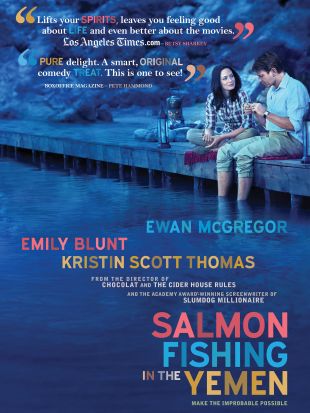
How does a director sell a love affair between two characters when one of the partners is closer to a wisp of an idea than a fully realized creation? That's the central issue left unresolved by Salmon Fishing in the Yemen, an unsuccessful fantasy comedy from director Lasse Hallstrom and scribe Simon Beaufoy.
As adapted from the 2007 novel by Paul Torday, the convoluted story first centers on Harriet Chetwode-Talbot (Emily Blunt), the manager of financial affairs for an amiable but eccentric Arabic man named Sheikh Muhammed (Amr Waked). A wealthy dreamer, Muhammed concocts a project that involves mass-irrigating a dry Yemeni riverbed and stocking it with tens of thousands of salmon, thereby introducing sport fishing to the arid region. To better gauge the feasibility of this enterprise, Talbot e-mails Dr. Alfred "Fred" Jones (Ewan McGregor), a Scottish scientist who specializes in establishing fisheries. A sardonic pessimist with no time for tomfoolery, he shoots the project down as an absurd suggestion, but then Patricia Maxwell (Kristin Scott Thomas), the press secretary to the British prime minister, catches wind of it and sees it as the ideal tool to play up positive relationships between the U.K. and the Middle East. A short time later, Fred and Harriet find themselves thrown together on the project and they begin to fall in love with one another -- a situation made more complicated by the fact that Harriet's boyfriend is a soldier stationed in the Middle East, and Alfred is already married, albeit unhappily.

With its fishing conceit that teeters gently on the brink of fantasy, this film attempts to draw an intuitive corollary between the fancifulness of the salmon scheme and the magic of the Alfred-Harriet romance -- the same sort of magic-realist connections, for example, repeatedly made in the literature of Laura Esquivel and Gabriel Garcia Marquez. That recipe feels splendid when it succeeds, and one can imagine how it might have soared in this picture, given slightly more conscientious treatment on the part of the filmmakers. As it stands, half of the equation works; the fish concept is curious and inventive enough to generate de facto interest. But it has to stand on its own, for the accompanying romance never delivers. We keep looking at Blunt and McGregor, waiting for some unifying chemistry between these two photogenic, charismatic actors that fails to develop. That's largely attributable to the fact that Harriet is so poorly conceived and drawn -- especially vis-à-vis her partner. In Alfred's case, Beaufoy enables us to understand with perfect clarity the emotional constipation of his character at the outset, along with his unrelenting cynicism and lack of hope regarding the world around him; in Harriet's presence, he arcs from being a sardonic, buttoned-up wiseass with an acid mouth to a gentle, laid-back romantic dreamer. That makes perfect sense, but to fully invest ourselves in the blossoming romance, we need an emotional transition for Harriet that is embossed with equal clarity -- and we never get one. As a result, the magnetism between these characters strikes one as fake and forced; you can feel the presence of the men behind the camera shoving them together, as the obstacles to the couple's happiness are conveniently ticked off one by one -- from Harriet's boyfriend shipping off to Afghanistan to Alfred's wife announcing that she's going to be out of town on business for a lengthy period. If Harriet were more than an outline of character notes, and her personality had been drawn to mesh with Alfred's, we wouldn't need conveniences such as the "other" partners leaving -- we would grasp the power of the romance independently of external considerations, and likely believe in its ability to overcome obstacles.
The comedic elements of the picture fare atrociously, coming off as far more klutzy and ill-conceived than the romance. Hallstrom and Beaufoy approach the first act of the picture by satirizing the circus of British politics and media, courtesy of Scott Thomas's character -- a shrill, caustic old tart with a thinly veiled contempt for everyone and everything. The filmmakers play Patricia's high-strung PR machinations for laughs, but she only succeeds at generating a headache. She was probably intended as wryly amusing, but obnoxious would be more precise. This character is too extreme and vicious to mesh with the brand of whimsical, lighthearted romantic comedy for which the filmmakers strive. For example, how are we to react when she needlessly tells off her primary-school-aged son with obscene language, or reacts with sardonic glee (in a wordless close-up) to events than threaten to separate Fred and Harriet? Between this and Scott Thomas's role in the recent movie Love Crime, one fears that this gifted, resplendent British actress may be getting typecast as a middle-aged shrew, and that's a shame because she is capable of a far greater range of types and parts than simply that.
Salmon Fishing would be a complete and utter waste of time were it not for a single element that does work: its depiction of the friendship between Fred and Muhammed. Especially during one sequence that has the men salmon fishing in a river behind the sheikh's estate, Hallstrom paints the film's central sport as a kind of deus ex machina for peace that supersedes all racial, ideological, and religious boundaries and unites men in spite of personal differences -- and, however briefly, we find ourselves believing that the sheikh could actually achieve incredible social and political aims with his river scheme. It's too bad, then, that nothing else in the film even comes close to achieving this level of persuasiveness.
